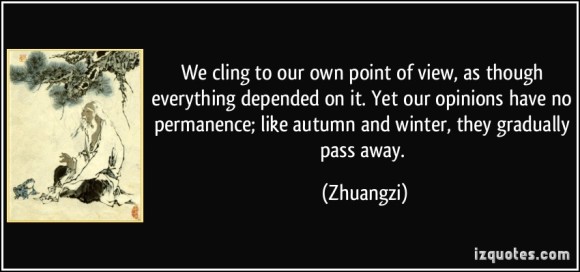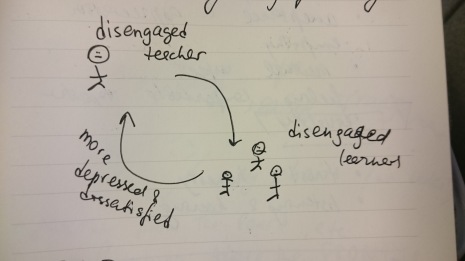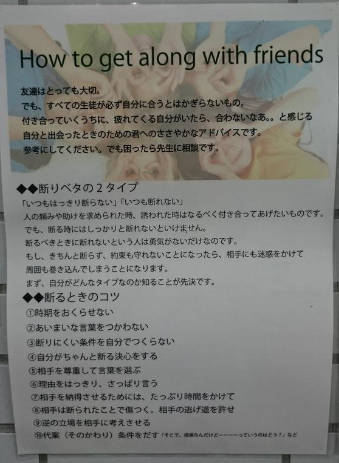I would write about why I am not blogging anymore and how guilty that makes me feel deep inside. I would write how every day I choose other, less painful and effort-demanding hobbies. I would write how I keep finding ways to escape doing writing of any sort. I would make a good case for support and understanding (“We’ve all been there, hitting that writer’s block”). I can easily picture myself writing that.
Instead, for what it’s worth, I will use this space to help me consolidate my ideas for another semester project paper. Purely practical reason, a writing I can’t delay any longer.
This past semester I had to identify “an issue” in one of my classes and keep a reflective journal registering my observations and/or any changes I brought about regarding it. I wanted to experiment with the format and try a dialogic journal. Every Friday after the lesson with the group in question I would write an entry in a Google doc. Then my colleague, co-creator of Reflective Practice Tokyo group and friend Matt Turner (known as a TEFLologist to some of you) would read my notes and leave his questions in relation to what I’d written before. Since for my article I need to make sense of the 20+ pages of that document, I will write two blog posts trying to sift through to the bottom. Mostly copy-paste from that Google doc, with a few comments from now in italics, here and there.
***** PART 1. MY NOTES. *****
Some time in early October, the beginning of the term.
Goals for semester 2 project should be related to my teaching beliefs from the previous project (do I act on that? how?)
- More reflective dialogue with students, among students
- Micro-writing (for reflection and/or self/peer assessment)
- Nurturing a community
- Attention to individual students
Focus of my journaling will be ***** class. The class has multiple issues that make it challenging for me to feel comfortable teaching this group. Group dynamics, low level, low motivation, individual students’ problematic areas, lack of active response to teacher instructions and to teacher in general, etc. It seems like a perfect chance to apply the ideas from my teaching beliefs stated above. Nurturing a community seems a priority. A community that would ensure mutual support and understanding. A community responsive to each other and to the teacher. —> I need to think of ways to reach that level through (a) attention and help to individual students; (b) dialogue with students through micro-writing? (c) class reflections. My concerns: too many concerns in that class, too many issues that I want to “fix”.
General issues that seemed like “issues” and prompted the journaling in the first place:
- Slow to understand instructions for activities; sometimes have to stop Presentation stage in the middle of their “discussion” time to explain the task again or model with a student;
- The use of Japanese in the first 2 classes was overwhelming;
- Uneven in terms of English level;
- In group discussions – limited interactions (very few follow-up questions, weak communication skills in general);
- Need constant clear reminders of the goals (to use the function language, for example);
- Need more time for practice and prep activities;
- Don’t greet each other as enter the room, nor chat;
- Take time to figure out tasks and even interpret discussion questions – seem lost and don’t ask me for help;
- Don’t look at me unless I ask them to, sometimes multiple times.
Measures I noted down as possibly helpful/necessary:
- Help them in discussion time as needed;
- Short fluency (2-1.5-1 instead of 3-2-1);
- Set simple clear goals in the beginning of class, get back to them at the end;
- Reduce instructional TTT to a minimum – have them DO more and help in the process;
- Increase attention to individual students;
- Provide clear structure;
- Work on checking understanding (communication skill we practise as part of the course);
- Focus of the day;
- Be firm about Japanese use;
- Find a wake-up activity for the beginning of class (always a slow torture!);
- One step at a time, don’t overload;
- Slower pace, change certain tasks from regular classes.
|
A selection of my own entries, written once a week on the day of the lesson. I can be diligent as needed.
*** Lesson 4 ***
Lesson goals on the board – speak 100% English and be interactive (drew a scheme of an interactive discussion, with a mess of arrows and questions). Got too wordy/passionate explaining that. Sometimes spoke when some students were not looking at me. Felt frustrated to have to call their names and ask them to look at me. Did that A LOT in the first half of class.
For the Deep End (presentation of target language) they did not start their discussion for a minute, looked at me and did not know what to do, so I had to stop and model the discussion with Sean. Then just explained the phrases.
There were 6 students present, so group discussions consisted of three people. By the end of class the students grew more responsive to me. At the end of the lesson asked them to write on sticky notes what was easy and difficult today in class.
Easy: only two people discussion; good reactions; speak in pairs; discussion with Brian, very interesting; talk about ways to learn English; talk with classmate, use communication skills. Difficult: giving different viewpoints; giving opinions; group discussion; ask questions; group discussion.
Important note to self: remember to always ask your students.
*** Lesson 5, Discussion Test, October (here I introduced a structure for the entries, that I followed till the end of the project) ***
What happened (my action, their action)
I didn’t make any changes to my original lesson plan and had students have a pair discussion (5 min) before a longer group discussion 1 with the same question. As I could hear, they were doing a fine job and discussed different viewpoints. Before discussion 1, I brought their attention to the fact that they each should ask at least 5 questions (and wrote them on the board). In group discussions, they almost never used reactions and didn’t ask many questions. We did a raise of hands on the questions asked. I opted out of doing a self-check so this was it for feedback.
Right before discussion 2 I asked everyone to stand up and sit down only after giving me 3 reactions they would use in the next discussion. In both the following discussion and especially in the test everyone did great with reactions, to the point of exaggerating and causing laughter. Most students did well on the questions in the test as well. When students were discussing in Japanese which questions to choose for the test, they seemed comfortable with each other (laughing). Nobody spoke Japanese during the test.
I try to remember to speak less and clearer. But after I explained to the second test group that they can take their time to choose good questions for the test, Lisa asked Tanya in Japanese what was it they were doing (I assume).
How we felt about it (my emotions, speculation about their emotional response)
I felt we’re warming up to each other (all). Especially so when we did reactions standing. They felt more relaxed. I’m never sure if Lisa understands what I’m saying and I don’t know how to check (when it’s not the task). I feel I should start speaking activities for them as soon as possible. Cut my talking and explanation time to an absolute minimum. But then how do I connect, get through to them in that case?…on a personal level. I mostly felt good in this class and about them, too. It took them longer to do things, but they were/seemed to be less confused than usual.
What does all that mean? (speculation about the causes)
It seems like recognizing by themselves what they are doing and not doing (through, say, counting) is helpful (when they see the evidence). Probably self-check sheets are not as helpful. A short, different kind of activity to lighten up the mood is helpful for the good class atmosphere, too (like with reactions). Their recent success with not speaking Japanese transferred into today’s class, so performance maybe was so good for that reason. That makes me think that they should have a feeling of SUCCESS. And 1-2 clearly and easily achievable goals for each class. But they are not the same for all of them, these goals, so setting the goals on the board for everyone maybe is not such a good idea…
What comes out of it? (ideas for future changes based on this class)
- 1 goal for all, 1 personal (give out sticky notes?)
- Short, different kind of activity in FB time to illustrate the point and practice straight away; no ticking the boxes in self-check sheets
- Stats – count something (that matters at this particular lesson).
*** Lesson 7, November ***
What happened (my action, their action)
In other classes I start the lesson by asking students if they checked any media in the morning and what they saw there and also share my own story. In this class I decided not to do this – on second thought, I should have done that. They could benefit from starting to talk from the very beginning of class. Other than that, I did not really change my lesson plan nor did they have any struggles! They were reasonably active and engaged in discussions, didn’t use Japanese! In fact, they performed really well and followed instructions straight away for almost every task. <…> At the end of class, I asked them to write easy and difficult points about the class again. One “bad point” Lisa’s discussion group mentioned in feedback was “slow discussion.” <…> I can notice that the dynamic of a group discussion, even if it is just 3 people, is significantly different from pair work. Slower and confused, indecisive as to who speaks and when.
How we felt about it (my emotions, speculation about their emotional response)
I never noticed or thought today that this class is “problematic.” When there was some confusion, I interfered and helped as possible. They figured out what to do quite quickly today and there was a nice feeling in the air, friendly and respectful.
What does all that mean? (speculation about the causes)
Some factors I’m thinking about:
- Ken (the confused guy from last class) was absent;
- I wasn’t scared of their failure (or rather did not expect it);
- Function language was clearly presented on the board as a dialogue.
What comes out of it? (ideas for future changes based on this class)
- Activate schemata for the lesson – by asking them questions or asking them to discuss some questions related to fluency and lesson topic.
- Include group work for stages other than group discussion (for example, Practice).
- Structure the discussion flow more clearly, especially the beginning.
- Write their good language on the board!! They often referred to the board today, where the key language was written.
- Think about the “slow discussion” – together??
*** Lesson 8, November ***
- Before the bell I tried to talk to them (“How are you?” for the most part). Lisa said she was genki, and in general there was some positive energy. Even though it was as quiet as ever before the bell.
- Next step was having them do the functions review. I said, “You can discuss and try to remember together” – nobody discussed, everyone worked individually.
- One more interesting point about Lisa today: the student she’s most likely to talk to in Japanese is Kim. Today in fluency she reminded him to speak English when he switched to Japanese. The same thing happened in discussion later.
How we felt about it (my emotions, speculation about their emotional response)
I felt relaxed in today’s class, for a change. There still was the same confusion as ever, but I didn’t react so negatively to it. It didn’t stress me out. There was some energy in this class, and even though discussions were slow, I talked to them about their strong points (many questions!!!) and weird points, HONESTLY, and we could laugh together.
What does all that mean? (speculation about the causes)
- Coming to class ready for “something challenging or different” changes perspective.
- I wonder if I was more scared of them than they were of speaking English.
*** Lesson 10, December ***
During fluency, the speakers were completely silent for a long time. Same was true for the Presentation (30 seconds in silence), so I came up to each group and asked “What’s your opinion about this topic?” <…> They started with “I don’t know” but then slowly got the energy and spoke about America and Sweden. <…> As the class progressed, they could start the activities quicker.
How we felt about it (my emotions, speculation about their emotional response)
I felt relaxed for the most part. When they were silent, I just waited and realized that I didn’t feel as frustrated as before. They need more time to start. <…> Students seemed more on board with the lesson flow, even if confused at times, mostly at the beginning of class and at the beginning of tasks.
What comes out of it? (ideas for future changes based on this class)
Starting the timer does not mean start of discussion in this group. They take it as a start to organize themselves. So maybe…(1) We should clarify together what we’re going to discuss now and how we go about it (prompt them to the first few questions in discussion flow); (2) Start the timer when they actually start their discussions.
*** Lesson 11, December ***
Target language presentation created a big confusion. One group for 1 minute looked at the handout and in Japanese said the names of the people in the picture there. I came up and drew their attention to the question to discuss and asked, “What’s your opinion, Haley?” – but nothing happened after that. Finally, Sean began talking. In the end, I didn’t use the timer in the presentation at all, but rather waited for them to get where I wanted them to get… For the practice stage, again I gave them more time than planned originally.
How we felt about it (my emotions, speculation about their emotional response)
It was a very energetic class, we felt comfortable and laughed and understood each other (even if they didn’t always understand the task!…). They listened to me more, looked at me when I was talking, engaged with me, responded when I elicited ideas from them. At the same time they were still confused in the first part of class, often confirming with each other. My current thought – what is wrong with them confirming with each other?? They are obviously more comfortable with each other than before. Isn’t it what I wanted?
What does all that mean? (speculation about the causes)
I can’t wrap my head around the reasons for their repeated confusion over tasks in the presentation and practice stages (which, honestly, resemble one another from class to class)… Do you have any ideas?….
*****
That’s what I asked Matt, my helpful journal companion. In my next post you can read quite a few of his questions based on the notes you’ve probably just read above. What a long post!.. And no conclusions drawn… I hope you don’t feel like you’ve wasted your time reading it, and I will secretly hope that some day somebody can find this post useful, whichever way that may be. If you have any questions or comments, please do leave them below.
Bottom line: I don’t feel like I’ve wasted my time on the beach. On the contrary, I finally feel the burden slightly lifted. The tugboat is at work now, slowly picking up speed.
Thank you for reading – and always supporting me.






